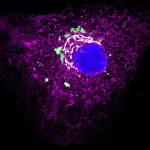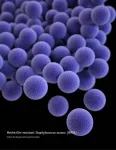(Press-News.org) Researchers at the Centre for Genomic Regulation in Barcelona and the University of Cologne in Germany have developed a new experimental strategy to tackle scarring and fibrosis. Experiments with patient-derived human cells and animal models showed the strategy was effective, non-toxic and its effects reversible. The findings are published today in the journal Nature Communications.
Scarring occurs from the secretion and accumulation of various components – primarily proteins known as collagens – into the space between individual cells, usually occurring as a response to injury or damage. Excessive collagen secretion can also cause the buildup of fibrotic tissue, a more serious condition where excess connective tissue is formed to the extent that it compromises the function of tissues and sometimes entire organs. Around 45% of deaths in the industrialised world are attributed to some form of tissue fibrosis.
Treatment options for both scarring and fibrosis are usually limited to surgery. Outside the body, scar tissue is often beneath the outer layer of the skin. Since most topical creams are not able to penetrate deeply enough to reach the affected areas effectively, their ability to remodel or heal the tissue is limited. Inside the body, scarring and fibrosis can affect many different tissues and organs, each with its unique environment and challenges and with no one-size-fits-all treatment option.
“Existing treatment options are usually ineffective because they try and fail to mop the excessive collagen up. In this work, we tried a completely different idea: to block the floodgates at the cellular level. The strategy works at the cellular level, releasing enough collagen so that tissues don’t fall apart while protecting them from excessive amounts that impairs their function,” explains ICREA Research Professor Vivek Malhotra, co-corresponding author of the study and researcher at the Centre for Genomic Regulation (CRG) in Barcelona, Spain.
The researchers’ new strategy involves using molecules known as peptides to block the export of collagen from inside cells. The peptides disrupt an interaction between two proteins called TANGO1 and cTAGE5. Both proteins bind to each other and are essential for the export of collagens from their site of synthesis inside the cell to the exterior. The two proteins “sit” at the endoplasmic reticulum exit site, a place in the cell where materials like proteins are packaged and transported out the cell.
“Targeting the endoplasmic reticulum exit site has been historically considered impossible because a third of all human proteins go through it, so inhibiting its activity would likely have many off-target, toxic effects. In other words, it’s been ‘undruggable’. Only recently have there been indications that there is some specificity for the secretory materials. In this study we aimed to achieve this specificity by inhibiting the interface between TANGO1 and cTAGE5 with targeted precision,” explains Dr. Ishier Raote, first author of the study who carried out the work at the Centre for Genomic Regulation.
Proteins are like puzzle pieces. To know how two pieces fit together, you need to see their shapes clearly. Both TANGO1 and cTAGE5 are large, complex proteins which constantly shapeshift. To date, their exact structure remains unknown, which in turn means we don’t understand how they connect at the molecular level, hindering efforts to design drugs that can block the interaction.
The researchers overcame this challenge by using AlphaFold2, an artificial-intelligence program that can guess the shapes of the two proteins without needing structural data about their 3D shape. The predictions made by AI allowed the authors of the study to design peptides which can pass through a cell membrane and disrupt the interaction between TANGO1 and cTAGE5.
The researchers tested the peptides using normal human fibroblasts, the most common type of cell found in connective tissue. The peptides successfully inhibited collagen export, causing it to accumulate inside the cells. The effect was also reversible, with collagen levels increasing again after the peptides were removed within a 48-hour period.
The researchers observed similar effects in experiments with fibroblasts from patients with scleroderma, a complex autoimmune disease characterized by fibrosis of the skin and internal organs. The peptides were then tested using zebrafish, a common animal model to study tissue development and wound healing. The strategy visibly reduced collagen deposition in wound areas.
The researchers next plan to evaluate the efficacy of the peptides in pig skin because it closely resembles human skin. They will also finetune the properties of the peptides to increase their potency.
“We believe this represents a new strategy to control the effects of collagen hypersecretion. This could range from alleviating the cosmetic effects of skin scarring to the treatment of autoimmune diseases like scleroderma, as well as to manipulate post-surgery related events associated with wound healing to prevent fibrosis,” concludes Dr. Malhotra.
The study was coordinated by researchers at the Centre for Genomic Regulation in Spain and the University of Cologne in Germany. It also includes collaborators from the Institut Jacques Monod in France, EMBL Barcelona, the Institute for Stem Cell Science and Regenerative Medicine (inStem) in India, ICFO-Institut de Ciencies Fotoniques in Spain, and the Max Planck Institute for Biology of Aging in Germany.
END
It takes two to TANGO: New strategy to tackle fibrosis and scarring
An experimental treatment is the first to tackle collagen hypersecretion at the cellular level
2024-04-24
ELSE PRESS RELEASES FROM THIS DATE:
Researchers aim to analyze pangenomes using quantum computing
2024-04-24
A new collaboration brings together a world-leading interdisciplinary team with skills across quantum computing, genomics, and advanced algorithms. They aim to tackle one of the most challenging computational problems in genomic science: building, augmenting and analysing pangenomic datasets for large population samples. Their project sits at frontiers of research in both biomedical science and quantum computing.
The project, which involves researchers based at the University of Cambridge, the Wellcome Sanger Institute and EMBL’s European ...
Ready and vigilant: immune cells on standby
2024-04-24
When pathogens invade the body, the immune system must react immediately to prevent or contain an infection. But how do our defence cells stay ready when no attacker is in sight? Scientists from Vienna have found a surprising explanation: They are constantly stimulated by healthy tissue. This keeps them active and ready to respond to pathogens. Based on this insight, future medications could be devised to selectively enhance our immune system’s attention. The study has been published in the journal Nature Immunology (DOI: 10.1038/s41590-024-01804-1).
Communication is crucial in immune defence. When ...
Securing competitiveness of energy-intensive industries through relocation: The pulling power of renewables
2024-04-24
“Our new study shows that renewable-scarce countries like parts of the EU, Japan and South Korea could save between 18 to 38 percent in production costs”, explains Philipp Verpoort, scientist at the Potsdam Institute for Climate Impact Research (PIK) and lead author of the study published in Nature Energy. “They could do so by relocating their production of industrial basic materials like green steel and chemicals based on green hydrogen to countries where renewable energy is cheap.” The use of renewable electricity and green hydrogen is ...
CAR T cell therapy targeting HER2 antigen shows promise against advanced sarcoma in phase I trial
2024-04-24
HOUSTON – (April 24, 2024) – Researchers at Texas Children’s Cancer Center and the Center for Cell and Gene Therapy at Baylor College of Medicine, Texas Children’s Hospital and Houston Methodist published results of a phase I clinical trial of a novel immunotherapy for high-risk sarcomas in the journal Nature Cancer.
The therapy uses chimeric antigen receptor (CAR) T cells engineered to target the HER2 protein, which is overexpressed on the surface of sarcoma cells. The HEROS 2.0 trial showed that this therapeutic approach is safe and is associated with clinical benefit.
“CAR T cell therapy has been a highly successful strategy for recurrent ...
Social change may explain decline in genetic diversity of the Y chromosome at the end of the Neolithic period
2024-04-24
The emergence in the Neolithic of patrilineal1 social systems, in which children are affiliated with their father's lineage, may explain a spectacular decline in the genetic diversity of the Y chromosome2 observed worldwide between 3,000 and 5,000 years ago. In a study to be published on 24 April in Nature Communications, a team of scientists from the CNRS, MNHN and Université Paris Cité3 suggest that these patrilineal organisations had a greater impact on the Y chromosome than mortality during conflict.
This ...
Aston University research finds that social media can be used to increase fruit and vegetable intake in young people
2024-04-24
The research team asked one group of participants to follow healthy eating accounts and another to follow interior design accounts
After just two weeks, participants following healthy eating accounts ate more fruit and vegetables and less junk food
Even minor tweaks to social media accounts could result in substantial diet improvements in young adults.
Researchers from Aston University have found that people following healthy eating accounts on social media for as little as two weeks ate more fruit and vegetables and less junk food.
Previous ...
A vaccine to fight antibiotic resistance
2024-04-24
Driven by the overuse of antimicrobials, pathogens are quickly building up resistances to once-successful treatments. It’s estimated that antimicrobial-resistant infections killed more than 1 million people worldwide in 2019, according to the World Health Organization.
“There are worries that at the rate things are going, in perhaps 20 or 30 years, few of our drugs will be effective at all,” said Xuefei Huang, a Michigan State University Research Foundation Professor in the departments ...
European Hormone Day 2024: Endocrine community unites to raise public awareness and push for policy action on hormone health
2024-04-24
European Hormone Day 2024: Endocrine community unites to raise public awareness and push for policy action on hormone health
European Hormone Day returns for the third year today, 24 April 2024, putting a spotlight on the vital role of hormones in chronic diseases such as diabetes, thyroid disorders, cancer and obesity, as well as many rare diseases.
The European Society of Endocrinology (ESE), the European Hormone and Metabolism Foundation (ESE Foundation), and partners from key groups and organisations across Europe and beyond will join forces to highlight simple steps we can all take towards better hormone health.
This builds on the success of the previous ...
Good heart health in middle age may preserve brain function among Black women as they age
2024-04-24
Research Highlights:
Middle-aged Black women with better heart health were less likely to show a decline in mental function compared with middle-aged Black women with worse heart health.
In this study, heart health was unrelated to cognitive decline among middle-aged white women.
A clinical trial is required to confirm if improving heart health among middle-aged Black women may slow cognitive decline and decrease the risk of dementia.
Embargoed until 2 a.m. CT/3 a.m. ET Wednesday, April 24, 2024
DALLAS, April 24, 2024 ...
The negative effects of racism impact sleep in adolescents
2024-04-24
Sleep and sleep disturbances have consequences for the development of adolescents and young adults. In a new article, researchers examine sleep during these periods, focusing on the effects of ethnic and racial discrimination. They conclude that improving sleep may boost health for all youth, but especially for those affected by racism.
The article, by researchers at Fordham University and the University of Illinois at Urbana-Champaign, appears in Child Development Perspectives, a journal of the Society for Research in Child Development.
“Discrimination ...
LAST 30 PRESS RELEASES:
Alkali cation effects in electrochemical carbon dioxide reduction
Test platforms for charging wireless cars now fit on a bench
$3 million NIH grant funds national study of Medicare Advantage’s benefit expansion into social supports
Amplified Sciences achieves CAP accreditation for cutting-edge diagnostic lab
Fred Hutch announces 12 recipients of the annual Harold M. Weintraub Graduate Student Award
Native forest litter helps rebuild soil life in post-mining landscapes
Mountain soils in arid regions may emit more greenhouse gas as climate shifts, new study finds
Pairing biochar with other soil amendments could unlock stronger gains in soil health
Why do we get a skip in our step when we’re happy? Thank dopamine
UC Irvine scientists uncover cellular mechanism behind muscle repair
Platform to map living brain noninvasively takes next big step
Stress-testing the Cascadia Subduction Zone reveals variability that could impact how earthquakes spread
We may be underestimating the true carbon cost of northern wildfires
Blood test predicts which bladder cancer patients may safely skip surgery
Kennesaw State's Vijay Anand honored as National Academy of Inventors Senior Member
Recovery from whaling reveals the role of age in Humpback reproduction
Can the canny tick help prevent disease like MS and cancer?
Newcomer children show lower rates of emergency department use for non‑urgent conditions, study finds
Cognitive and neuropsychiatric function in former American football players
From trash to climate tech: rubber gloves find new life as carbon capturers materials
A step towards needed treatments for hantaviruses in new molecular map
Boys are more motivated, while girls are more compassionate?
Study identifies opposing roles for IL6 and IL6R in long-term mortality
AI accurately spots medical disorder from privacy-conscious hand images
Transient Pauli blocking for broadband ultrafast optical switching
Political polarization can spur CO2 emissions, stymie climate action
Researchers develop new strategy for improving inverted perovskite solar cells
Yes! The role of YAP and CTGF as potential therapeutic targets for preventing severe liver disease
Pancreatic cancer may begin hiding from the immune system earlier than we thought
Robotic wing inspired by nature delivers leap in underwater stability
[Press-News.org] It takes two to TANGO: New strategy to tackle fibrosis and scarringAn experimental treatment is the first to tackle collagen hypersecretion at the cellular level






